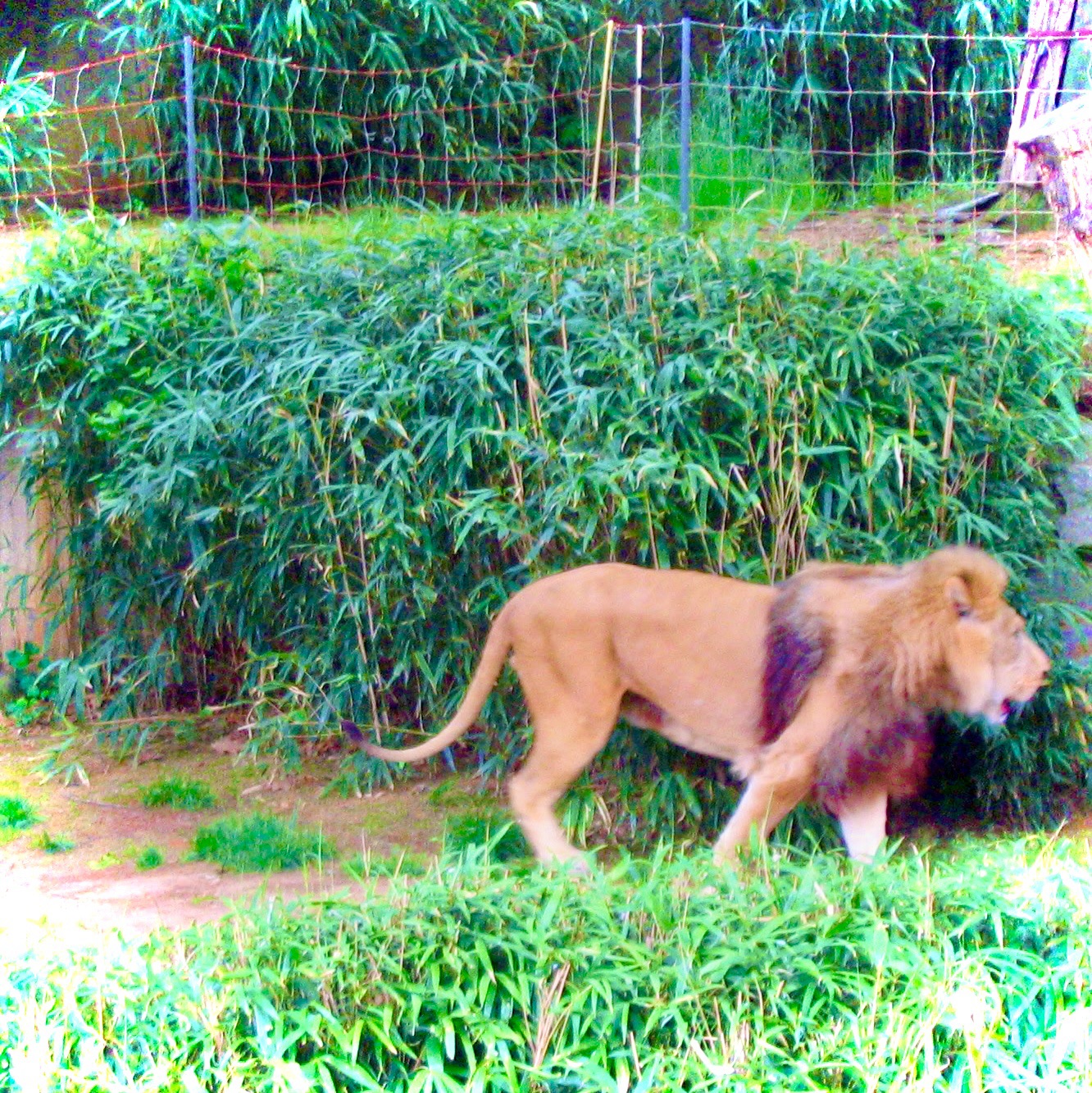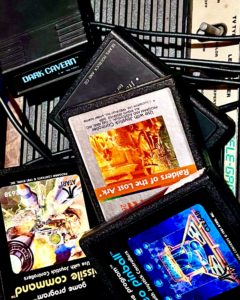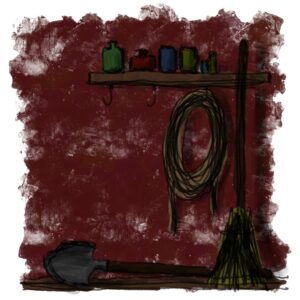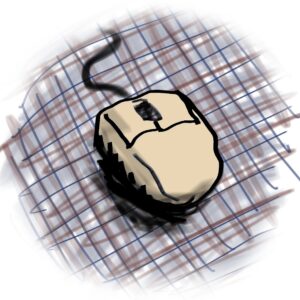The headless corpse of a chupacabra lay in the mulch below the lion topiary. “Third time this month,” grumbled Tom the gardener, prodding at the thing with his foot as he wiped the sweat from his forehead with a handkerchief. The day already looked to be a scorcher, and the close-knit passages of the hedge maze trapped the morning’s hot, damp air in soggy clouds that clung to everything they touched. There was absolutely no trace of any air movement beyond his own breath, and even that felt like blowing molasses uphill through a cocktail straw.
He knelt, looking closely at the ragged gashes across the dead animal’s neck and body. Small green leaves and bits of bark were mashed into wounds that looked as if they’d been made by a chainsaw. A thorn-saw.
“Well?” he said, straightening. He looked up at the lion-shaped shrubbery. “What have you got to say for yourself?”
He heard a rustling from the other side of the path. A spiny boxwood—a hybrid plant he’d developed himself—was trimmed into the shape of an armored knight holding a great double-headed axe. It was looking away, as if minding its own business.
“That’s right, you keep out of this,” he said. “Now, where has the rest got to?” He followed a trail of gore across the flagstones to the barberry hedge, which was more red-speckled than usual. The chupacabra’s scaly head was sitting cockeyed under a branch, its tongue lolling out like a piece of strawberry taffy. A singular fly buzzed around its mud-spattered new treasure.
This wouldn’t do at all. The grange fair was coming around, and he had an honest shot at the blue ribbon this year in both the “Permanent Topiary” and “Hedge Maze” categories. But not if he couldn’t keep his topiary permanent.
He scooped up the head with his spade and deposited it on a pile of loose branches and other horticultural detritus in the back of his gardener’s cart, then walked back to the hedge lion and its vanquished prey. He stopped, pulling out his shears to trim an errant twig sprouting from the big leafy cat’s rump. The shrub twitched, leaves quivering, though there was no breeze.
“What am I going to do with you, hmm?” Tom said to nobody in particular as he squatted down, grabbing the scaly corpse by its hind legs. He reminded himself to lift with his knees. “The Master gets upset when his pets go missing, you know.”
There was an absence of even the slightest gentle zephyr, yet the lion’s mane of fine green buds trembled, and the gardener paused. “Oh? Well then, show me.”
He let go of the dead body and started to stand, but the green lion shook again, its shimmying motion drawing his eyes downward, towards its narrow trunk. He got down on his knees and crept beneath the thick, thorny branches to get a better look—a gesture of trust between exotic horticulturist and exotic horticulture if ever there was one.
Tom found himself surprised he hadn’t smelled it before, as the scent came at him all at once. It was sharp and pungent and lingering. He squinted in the dim light. “Ahh,” he said after a moment. “I see it.” Thin, dark lines crisscrossed the mulch and the bark of the shrub, leaving both burned as if by acid; thin wisps of smoke still wafted up into the damp air. The trunk was scarred with what looked like splashes and drip marks, evidence of past damage done by perhaps a similar source.
The gardener backed out of the damp, sticky topiary and stood to face the leaf sculpture, which looked about as smug as a hedge could hope to be. “Marking their territory,” he said. “I didn’t think the domesticated ones would bother.”
The shrub shuddered once more, insistently. “No, no, you’re right,” Tom said in reply. “We’ll do something about it. Can’t have this sort of thing. Not good for you, not good for them either.” He nodded at the dead beast.
Walking to his cart, he looked around to be certain he was alone, then began to dig through his tools. “There it is,” he said a moment later, and he pulled out a small plastic baggie. He opened it furtively; a passerby might have been excused for thinking that the knight topiary was leaning towards the gardener, as if trying to catch a glimpse of what he was doing. Whatever it was, it was well hidden by the mess of gardening implements, although it made a sound like tissue paper as he fiddled with the contents.
He finished his rummaging and put things back in messy order. But if either topiary had been given eyes, they would have observed that he had something palmed in his right hand as he walked back towards the hedges.
Ducking beneath the branches of the bushy lion, he pressed something small and white into the mulch and brushed the soil carefully over the top, first on one side of the trunk, then the other. He emerged, then went to the knight topiary and repeated the process. “Just to be safe,” he muttered.
He wrinkled his nose as he emerged from under the sculpted warrior shrub. “Good thing the Master doesn’t come out here much,” he said, and walked back to his cart, where he spent a long time scrubbing his hands with soap in a bucket of water, which he then dumped beneath the hedge. He sniffed each hand carefully, then sniffed around his cart, and finally, sniffed the air around the hedge, cocking his head to the side and mumbling “Good enough, I suppose.”
Then, with a start, as if suddenly remembering a forgotten errand, he went back to removing the body of the headless chupacabra. “This’ll help hide the smell, if anything,” he said, as he manhandled the corpse into the front of his cart without bothering to put on gloves.
At last, he stood back, admiring his work. This portion of the topiary was flawless: the knight looked as if he might bring the axe down on a trespasser’s skull at any moment, and he could almost hear the lion’s mighty roar as he raked the flesh from intruders’ very bones. Most importantly, they were unlikely to be damaged by territorial chupacabras in the future, thanks to his bit of illicit organic pest control.
Tom smiled, thinking about his blue ribbons. Then he frowned, thinking of the incident the year before last with the judge who got a bit too close to the exhibit. He still needed to do something about that.
He shrugged. Plenty of projects for later. He wheeled the cart off down the path to a spot behind the castle where branches, leaves, and inconvenient corpses could be disposed of without further trouble. He believed in composting.



